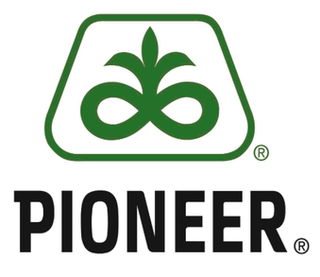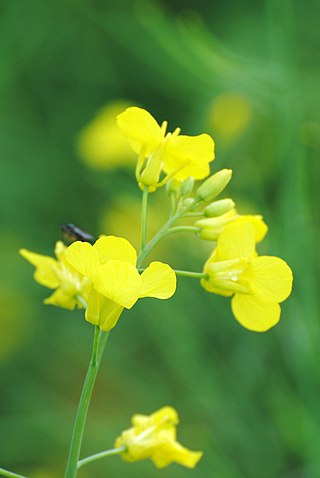The Monsanto Company was an American agrochemical and agricultural biotechnology corporation founded in 1901 and headquartered in Creve Coeur, Missouri. Monsanto's best-known product is Roundup, a glyphosate-based herbicide, developed in the 1970s. Later, the company became a major producer of genetically engineered crops. In 2018, the company ranked 199th on the Fortune 500 of the largest United States corporations by revenue.
Roundup is a brand name of herbicide originally produced by Monsanto, which Bayer acquired in 2018. Prior to the late-2010s formulations, it used broad-spectrum glyphosate-based herbicides. As of 2009, sales of Roundup herbicides still represented about 10 percent of Monsanto's revenue despite competition from Chinese producers of other glyphosate-based herbicides. The overall Roundup line of products represented about half of Monsanto's yearly revenue in 2009. The product is marketed to consumers by Scotts Miracle-Gro Company. In the late-2010s other non-glyphosate containing herbicides were also sold under the Roundup brand.

Rapeseed, also known as rape and oilseed rape, is a bright-yellow flowering member of the family Brassicaceae, cultivated mainly for its oil-rich seed, which naturally contains appreciable amounts of erucic acid. The term "canola" denotes a group of rapeseed cultivars that were bred to have very low levels of erucic acid and which are especially prized for use as human and animal food. Rapeseed is the third-largest source of vegetable oil and the second-largest source of protein meal in the world.

Percy Schmeiser was a Canadian businessman, farmer, and politician. In 1954, he took over the operations of the family owned farm, gas station, and farm equipment dealership. He renamed the farm equipment dealership Schmeiser's Garage and added a second farm equipment dealership in Humboldt, Saskatchewan in 1986 and oversaw their operations until their sale in 2003.

Monsanto Canada Inc v Schmeiser [2004] 1 S.C.R. 902, 2004 SCC 34 is a leading Supreme Court of Canada case on patent rights for biotechnology, between a Canadian canola farmer, Percy Schmeiser, and the agricultural biotechnology company Monsanto. The court heard the question of whether Schmeiser's intentionally growing genetically modified plants constituted "use" of Monsanto's patented genetically modified plant cells. By a 5-4 majority, the court ruled that it did. The Supreme Court also ruled 9-0 that Schmeiser did not have to pay Monsanto their technology use fee, damages or costs, as Schmeiser did not receive any benefit from the technology. The case drew worldwide attention and is widely misunderstood to concern what happens when farmers' fields are accidentally contaminated with patented seed. However, by the time the case went to trial, all claims of accidental contamination had been dropped; the court only considered the GM canola in Schmeiser's fields, which Schmeiser had intentionally concentrated and planted. Schmeiser did not put forward any defence of accidental contamination.

Genetically modified crops are plants used in agriculture, the DNA of which has been modified using genetic engineering methods. Plant genomes can be engineered by physical methods or by use of Agrobacterium for the delivery of sequences hosted in T-DNA binary vectors. In most cases, the aim is to introduce a new trait to the plant which does not occur naturally in the species. Examples in food crops include resistance to certain pests, diseases, environmental conditions, reduction of spoilage, resistance to chemical treatments, or improving the nutrient profile of the crop. Examples in non-food crops include production of pharmaceutical agents, biofuels, and other industrially useful goods, as well as for bioremediation.

Pioneer Hi-Bred International, Inc. is a U.S.-based producer of seeds for agriculture. They are a major producer of genetically modified crops with insect and herbicide resistance.
Since the advent of genetic engineering in the 1970s, concerns have been raised about the dangers of the technology. Laws, regulations, and treaties were created in the years following to contain genetically modified organisms and prevent their escape. Nevertheless, there are several examples of failure to keep GM crops separate from conventional ones.

Genetically modified food controversies are disputes over the use of foods and other goods derived from genetically modified crops instead of conventional crops, and other uses of genetic engineering in food production. The disputes involve consumers, farmers, biotechnology companies, governmental regulators, non-governmental organizations, and scientists. The key areas of controversy related to genetically modified food are whether such food should be labeled, the role of government regulators, the objectivity of scientific research and publication, the effect of genetically modified crops on health and the environment, the effect on pesticide resistance, the impact of such crops for farmers, and the role of the crops in feeding the world population. In addition, products derived from GMO organisms play a role in the production of ethanol fuels and pharmaceuticals.

Dicamba is a selective systemic herbicide first registered in 1967. Brand names for formulations of this herbicide include Dianat, Banvel, Diablo, Oracle and Vanquish. This chemical compound is a chlorinated derivative of o-anisic acid. It has been described as a "widely used, low-cost, environmentally friendly herbicide that does not persist in soils and shows little or no toxicity to wildlife and humans."

Intensive crop farming is a modern industrialized form of crop farming. Intensive crop farming's methods include innovation in agricultural machinery, farming methods, genetic engineering technology, techniques for achieving economies of scale in production, the creation of new markets for consumption, patent protection of genetic information, and global trade. These methods are widespread in developed nations.
Roundup Ready is the Monsanto trademark for its patented line of genetically modified crop seeds that are resistant to its glyphosate-based herbicide, Roundup.

SmartStax is a brand of genetically modified seed made through a collaboration between Monsanto Company and Dow Chemical Company. It takes advantage of multiple modes of insect protection and herbicide tolerance. SmartStax takes advantage of Yieldgard VT Triple (Monsanto), Herculex Xtra (Dow), RoundUp Ready 2 (Monsanto), and Liberty Link (Dow). The traits included protect against above-ground insects, below-ground insects, and provide broad herbicide tolerance. It is currently available for corn, but cotton, soybean, and specialty crop variations are to be released. Previously, the most genes artificially added to a single plant was three, but Smartstax includes eight. Smartstax also incorporates Monsanto's Acceleron Seed Treatment System which protects against insects at the earliest stages of development. Smartstax is sold under the Genuity (Monsanto) and Mycogen (Dow) brands.

Bayer AG is a German multinational pharmaceutical and biotechnology company and is one of the largest pharmaceutical companies and biomedical companies in the world. Headquartered in Leverkusen, Bayer's areas of business include: pharmaceuticals, consumer healthcare products, agricultural chemicals, seeds and biotechnology products. The company is a component of the EURO STOXX 50 stock market index.

A genetically modified soybean is a soybean that has had DNA introduced into it using genetic engineering techniques. In 1996, the first genetically modified soybean was introduced to the U.S. by Monsanto. In 2014, 90.7 million hectares of GM soybeans were planted worldwide, making up 82% of the total soybeans cultivation area.
BASF Plant Science is a subsidiary of BASF in which all plant biotechnology activities are consolidated. The company was founded in 1998 and employs approximately 700 people at 6 different locations worldwide. The headquarters of BASF Plant Science is located in Research Triangle Park and has research sites in the US, Canada, and Europe. The company mainly develops genetically modified seeds at these locations.
Genetically modified canola is a genetically modified crop. The first strain, Roundup Ready canola, was developed by Monsanto for tolerance to glyphosate, the active ingredient in the commonly used herbicide Roundup.

Delta & Pine Land Company was initially chartered in Mississippi in 1886 as a land speculation company, but was inactive until 1919, when a British textile company acquired the name. In the 1920s and 1930s, the company operated one of the largest cotton plantations in the Mississippi Delta, with headquarters in Scott, Mississippi. In the latter half of the 20th century, the company divested its farm lands, concentrated on research and development of cotton and soybean seeds, and became world-renowned for its development of Deltapine cotton varieties.
Monsanto was involved in several high-profile lawsuits, as both plaintiff and defendant. It had been defendant in a number of lawsuits over health and environmental issues related to its products. Monsanto also made frequent use of the courts to defend its patents, particularly in the area of agricultural biotechnology. Bayer acquired Monsanto in 2018, and the company has since been involved in litigation related to ex-Monsanto products such as glyphosate, PCBs and dicamba. In 2020 it paid over $10 billion to settle lawsuits involving the glyphosate based herbicide Roundup.

Rapeseed oil is one of the oldest known vegetable oils. There are both edible and industrial forms produced from rapeseed, the seed of several cultivars of the plant family Brassicaceae. Historically, it was restricted as a food oil due to its content of erucic acid, which in laboratory studies was shown to be damaging to the cardiac muscle of laboratory animals in high quantities and which imparts a bitter taste, and glucosinolates, which made many parts of the plant less nutritious in animal feed. Rapeseed oil from standard cultivars can contain up to 54% erucic acid.












